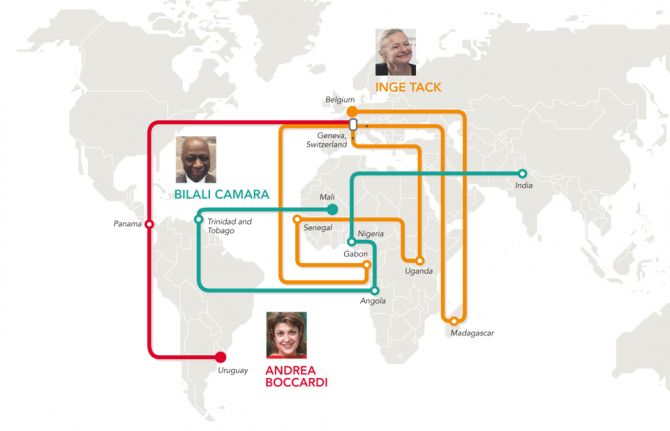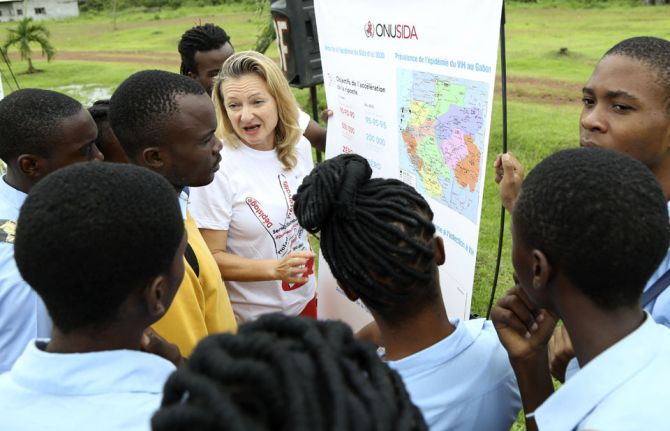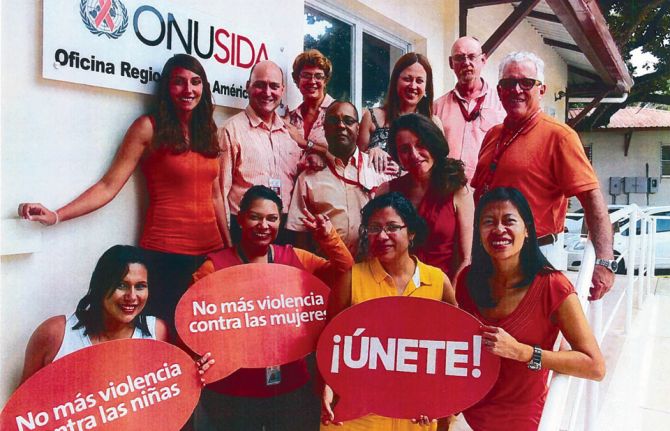



Feature Story
It’s about the people we serve: UNAIDS staff connecting the world
29 March 2018
29 March 2018 29 March 2018“Partnerships, partnerships, partnerships,” said Inge Tack. “That’s what motivates me every morning.”
Partnerships are also her background. When she joined UNAIDS in 1999, she worked on a new initiative, the International Partnership against AIDS in Africa, which involved getting buy-in from governments, the private sector, the United Nations and communities. She then moved to Uganda as the Technical Adviser helping the national AIDS commission with its various constituencies. Ms Tack then headed to western Africa, to the UNAIDS regional bureau to become the Partnerships Adviser.
“I travelled to many of the 19 countries in that region, where travelling is not easy, but I loved the job,” she said. “Supporting country offices, being the broker and convener at the regional level for governments, regional economic communities, donors and people living with HIV in a challenging environment was definitely a huge learning experience,” Ms Tack said. Gaining everyone’s trust was key, she added. She also relished the role because UNAIDS’ neutrality and expertise, she explained, made it the go-to office for HIV.
In 2012, Ms Tack became UNAIDS Country Director in Gabon, allowing her to zero in on one country. “I was the boss of a very small team, but with an enormous scope to do it all,” she said. The variety thrilled her.
“I never had a dull day in Gabon,” she said describing a typical day, which could take her to the presidential palace in the morning, an HIV workshop in the afternoon and an evening meeting discussing health with investors.
Aside from partnerships, she forged real connections with people.
“At the end, it is all about people, giving them hope and encouraging them to help each other,” Ms Tack said. A lot of young people have limited opportunities, so she became a sort of cheerleader for them.
In one case, a young mother living with HIV came to her office saying she could no longer bear her life. Ms Tack sensed that the young woman could perhaps share her story with other teens. “It blew me away how she recounted her tale and connected to people,” she said. Slowly but surely, the young woman gained confidence. The Gabon office helped launch a network for young people living with HIV to raise awareness about HIV prevention and to guide people on adhering to treatment. “And you know what?” she asked. “That woman now has become a community health worker, paid for by the local mayor’s office,” she said beaming.
Ms Tack’s new job in the Programme Partnerships and Fundraising Department has brought her back to Geneva, Switzerland, closer to her native Belgium. Fundraising has changed so dramatically that she wanted to come back to headquarters and refresh her skills. “I believe it’s important to match funds to real country needs,” she said. She also thinks that UNAIDS needs to innovate more on raising funds. Looking up from her computer, she said, “When I feel like I have gotten a good handle on that, then I can return to the country level and put it into implementation!”
UNAIDS staff work in 79 country offices and six regional offices and at its headquarters in Geneva. It also has liaison offices at the United Nations Headquarters in New York and in Washington, DC, United States of America, and at the African Union in Addis Ababa, Ethiopia. The nearly 700 staff members come from 123 countries and more than 60% of the staff work in the field.
Bilali Camara joined UNAIDS in 2008 in Trinidad and Tobago as a Regional Monitoring and Evaluation Adviser. “I had to establish a strong network at national levels across the Caribbean,” he said. This involved a lot of sharing of lessons and problem-solving, he explained. When he moved to Angola as the Country Director, his networks involved fewer people, but he networked tirelessly. He’s particularly proud of having connected a basketball coach with a radio director to air zero discrimination messages. For the next campaign he asked a famous musician, a transgender singer, to help. As a result, he said, they reached thousands of people with HIV awareness messages.
Mr Camara reiterated this endeavour when he became the Country Director in Nigeria. In this instance, he explained, the real push involved lowering the number of babies becoming infected with HIV. Too few pregnant women knew their HIV status and their babies were being missed by HIV services. “We had to reach people, and the best way to do that was contacting them by phone,” Mr Camara said. UNAIDS Nigeria partnered with a telecom company and millions of people received HIV prevention text messages. “With that momentum, HIV testing became part of the prenatal care package in the country,” he said.
Mr Camara said that what keeps him moving forward is people tell him that they appreciate what UNAIDS has done.
Forward and onward he has gone. Mr Camara just became the UNAIDS Country Director in India. What has struck him so far is how involved the key populations are in the AIDS response. “The level of ownership here has truly impressed me,” Mr Camara said. “When it comes to public health, if communities lead the way, then that is a sign of success.”
Success for Andrea Boccardi saw her start out as an obstetrics and gynecology doctor advising Uruguayan Army peacekeeping operations and learning about the HIV policy and programming of the United Nations Department of Peacekeeping Operations. She now focuses on gender-based violence and the elimination of discrimination.
“It’s a dream come true,” she said. “I now have the opportunity to implement the UNAIDS vision of zero discrimination in health-care settings.” Standing in her office, her walls decorated with certificates and photos of Uruguay, Panama and Geneva, she explained how privileged she has felt to have moved around the world and departments.
In 2003, UNAIDS hired her as an HIV Adviser on Security and the Humanitarian Response in Latin America, ending her career as a military doctor. She recalls that her past job came in useful when she trained United Nations peacekeeping troops deploying to Haiti and the Congo.
Two years later she transferred to Panama. Ms Boccardi helped open the UNAIDS regional office, working on programming and technical support. “I did a lot of running around trying to make sure that we were on top of human rights, prevention, treatment and universal access to health,” she said, sighing at the thought of what that entailed.
When her rotation came up, Ms Boccardi said she wanted to move beyond policy and work towards the UNAIDS global prevention agenda to bring change on the ground. Her transition to headquarters in Geneva was seamless. She described her daughters having a tougher time with the French homework, but overall loving the independence that the vast Swiss bus and train system gives them.
In the past 10 years, nearly 500 staff have participated in mobility and more than 400 staff have been reassigned to multiple duty stations. In 2018, about 30 staff members will move from their current posts to new posts.
After working on prevention, Ms Boccardi recently joined the Human Rights and Gender Team.
Pointing to the Spanish words engraved at the bottom of a framed pre-Columbian small gold frog by her desk that read, “Leader, guide, friend”, Ms Boccardi said this had become her mantra in life to balance work, family and friends.
More in this series: UNAIDS staff share global experience on AIDS through criss-crossing the world



